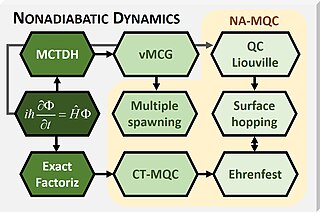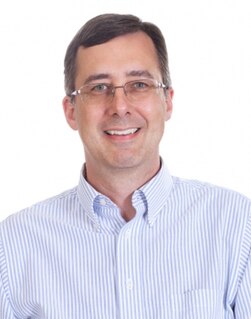Related Research Articles
Computational chemistry is a branch of chemistry that uses computer simulation to assist in solving chemical problems. It uses methods of theoretical chemistry, incorporated into computer programs, to calculate the structures and properties of molecules, groups of molecules, and solids. It is necessary because, apart from relatively recent results concerning the hydrogen molecular ion, the quantum many-body problem cannot be solved analytically, much less in closed form. While computational results normally complement the information obtained by chemical experiments, it can in some cases predict hitherto unobserved chemical phenomena. It is widely used in the design of new drugs and materials.
The following outline is provided as an overview of and topical guide to chemistry:
The following outline is provided as an overview of and topical guide to physics:
Quantum chemistry, also called molecular quantum mechanics, is a branch of chemistry focused on the application of quantum mechanics to chemical systems. Understanding electronic structure and molecular dynamics using the Schrödinger equations are central topics in quantum chemistry.

Theoretical chemistry is the branch of chemistry which develops theoretical generalizations that are part of the theoretical arsenal of modern chemistry: for example, the concepts of chemical bonding, chemical reaction, valence, the surface of potential energy, molecular orbitals, orbital interactions, and molecule activation.
Chemical physics is a subdiscipline of chemistry and physics that investigates physicochemical phenomena using techniques from atomic and molecular physics and condensed matter physics; it is the branch of physics that studies chemical processes from the point of view of physics. While at the interface of physics and chemistry, chemical physics is distinct from physical chemistry in that it focuses more on the characteristic elements and theories of physics. Meanwhile, physical chemistry studies the physical nature of chemistry. Nonetheless, the distinction between the two fields is vague, and scientists often practice in both fields during the course of their research.

Henry Frederick "Fritz" Schaefer III is a computational and theoretical chemist. He is one of the most highly cited chemists in the world, with a Thomson Reuters H-Index of 121 as of 2020. He is the Graham Perdue Professor of Chemistry and Director of the Center for Computational Chemistry at the University of Georgia.
The National Academy of Sciences Award in Chemical Sciences is awarded for innovative research in the chemical sciences that in the broadest sense contributes to a better understanding of the natural sciences and to the benefit of humanity.

Anna I. Krylov is a Professor of Chemistry at the University of Southern California (USC), working in the field of theoretical and computational quantum chemistry. She is the inventor of the spin-flip method. Krylov is the president of Q-Chem, Inc. and an elected member of the International Academy of Quantum Molecular Science and the Academia Europaea.

Debashis Mukherjee is a theoretical chemist, well known for his research in the fields of molecular many body theory, theoretical spectroscopy, finite temperature non-perturbative many body theories. Mukherjee has been the first to develop and implement a class of many-body methods for electronic structure which are now standard works in the field. These methods, collectively called multireference coupled cluster formalisms, are versatile and powerful methods for predicting with quantitative accuracy the energetics and cross-sections of a vast range of molecular excitations and ionization. A long-standing problem of guaranteeing proper scaling of energy for many electron wave-functions of arbitrary complexity has also been first resolved by him. He has also been the first to develop a rigorously size-extensive state-specific multi-reference coupled cluster formalism, and its perturbative counterpart which is getting increasingly recognized as a very promising methodological advance.

William Hughes Miller is a professor at the University of California, Berkeley and a leading researcher in the field of theoretical chemistry.

CP2K is a freely available (GPL) quantum chemistry and solid state physics program package, written in Fortran 2008, to perform atomistic simulations of solid state, liquid, molecular, periodic, material, crystal, and biological systems. It provides a general framework for different methods: density functional theory (DFT) using a mixed Gaussian and plane waves approach (GPW) via LDA, GGA, MP2, or RPA levels of theory, classical pair and many-body potentials, semi-empirical and tight-binding Hamiltonians, as well as Quantum Mechanics/Molecular Mechanics (QM/MM) hybrid schemes relying on the Gaussian Expansion of the Electrostatic Potential (GEEP). The Gaussian and Augmented Plane Waves method (GAPW) as an extension of the GPW method allows for all-electron calculations. CP2K can do simulations of molecular dynamics, metadynamics, Monte Carlo, Ehrenfest dynamics, vibrational analysis, core level spectroscopy, energy minimization, and transition state optimization using NEB or dimer method.
In physics, quantum dynamics is the quantum version of classical dynamics. Quantum dynamics deals with the motions, and energy and momentum exchanges of systems whose behavior is governed by the laws of quantum mechanics. Quantum dynamics is relevant for burgeoning fields, such as quantum computing and atomic optics.
Frank Neese is a German theoretical chemist at the Max Planck Institute for Coal Research. He is the author of more than 440 scientific articles in journals of Chemistry, Biochemistry and Physics. His work focuses on the theory of magnetic spectroscopies and their experimental and theoretical application, local pair natural orbital correlation theories, spectroscopy oriented configuration interaction, electronic and geometric structure and reactivity of transition metal complexes and metalloenzymes. He is lead author of the ORCA quantum chemistry computer program. His methods have been applied to a range of problems in coordination chemistry, homogeneous catalysis, and bioinorganic chemistry.
Eric R. Bittner, FRSC is a theoretical chemist, physicist, and distinguished professor of chemical physics at the University of Houston.

Donald Gene Truhlar is an American scientist working in theoretical and computational chemistry and chemical physics with special emphases on quantum mechanics and chemical dynamics.
Sharon Hammes-Schiffer is a physical chemist who has contributed to theoretical and computational chemistry. She is currently a Sterling Professor of Chemistry at Yale University. She has served as senior editor and deputy editor of the Journal of Physical Chemistry and advisory editor for Theoretical Chemistry Accounts. Since As of 1 January 2015 she is editor-in-chief of Chemical Reviews.

Mixed quantum-classical (MQC) dynamics is a class of computational theoretical chemistry methods tailored to simulate nonadiabatic (NA) processes in molecular and supramolecular chemistry. Such methods are characterized by:
- Propagation of nuclear dynamics through classical trajectories;
- Propagation of the electrons through quantum methods;
- A feedback algorithm between the electronic and nuclear subsystems to recover nonadiabatic information.

David Sherrill is a Professor of Chemistry and Computational Science and Engineering at Georgia Tech working in the areas of theoretical chemistry, computational quantum chemistry, and scientific computing. His research focuses on the development and application of theoretical methods for non-covalent interactions between molecules. He is the lead principal investigator of the Psi open-source quantum chemistry program.
References
- ↑ Robert Wyatt’s New Approach to Fundamental Problems in Quantum Chemistry, Texas Advanced Computing Center, Austin University of Texas (downloaded December 2, 2011)
- ↑ Endowed Chairs for Faculty Research and Teaching, Department of Chemistry and Biochemistry, University of Texas at Austin (downloaded December 2, 2011)
- ↑ Professor Lykos Speaks at Conference Honoring Robert Wyatt, Illinois Institute of Technology (downloaded December 2, 2011)
- ↑ "APS Fellow Archive". APS. Retrieved 5 October 2020.